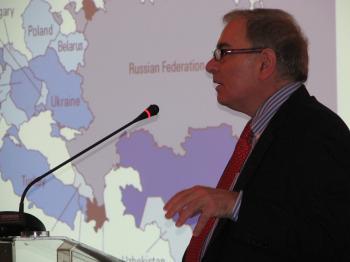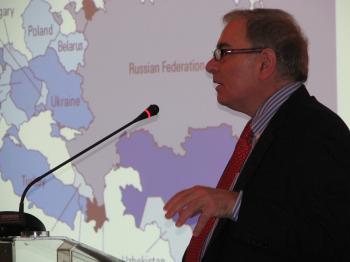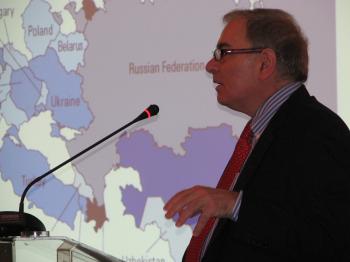SOFIA, Bulgaria—The financial crisis threatens over 40 million people in Europe and Central Asia with continued poverty and an additional 120 million people may reach the poverty line in the new year, states a World Bank regional report, “Crisis Hits Home—Stress-Testing Households in Europe and Central Asia.”
“One of the tragic impacts of the crisis has been that the middle income countries that had turned the corner are the ones hardest hit. Across countries in the region, unemployment levels have risen while economic activities have collapsed. Poverty will rise. Families are being stretched to the limit,” says the report.
Bulgaria was the first European country to hear the report first hand since it was formally launched on Dec. 2 in Washington, D.C. The report’s author, Mr. Luca Barbone, director for Poverty Reduction and Economic Management in the World Bank’s Europe and Central Asia Region, introduced his findings in Sheraton Hotel Balcan in the capital Sofia on Dec. 7, 2009.
The event in Sofia was opened by Deputy Minister of Labor and Social Policy Mrs. Valentina Simeonova—invited were governmental officials, civil society representatives, think tanks and EU ambassadors.
The report revealed that during next year, a total of 160 million citizens in Europe and Central Asia risk losing their jobs, homes, and basic services. The substantial improvements in living standard reached in the last decade might reverse due to the strong economic slowdown in the region. The main shocks for households during the ongoing crisis are limited access to credit markets, increasing prices of goods and services, and rising unemployment.
“The countries which were the hardest hit by the crisis in Europe and Central Asia, are mostly the Baltic countries lie Latvia and Estonia. Turkey, Armenia, and Kyrgyzstan were also among the severely impacted parts of the region,” Mr. Luca Barbone said.
For example, it is possible that up to 20 percent more families with mortgages and other loans in Lithuania and Hungary could be at risk of defaulting on their loans.
“Poland was the luckiest among all,” added Barbone.
“One of the tragic impacts of the crisis has been that the middle income countries that had turned the corner are the ones hardest hit. Across countries in the region, unemployment levels have risen while economic activities have collapsed. Poverty will rise. Families are being stretched to the limit,” says the report.
Bulgaria was the first European country to hear the report first hand since it was formally launched on Dec. 2 in Washington, D.C. The report’s author, Mr. Luca Barbone, director for Poverty Reduction and Economic Management in the World Bank’s Europe and Central Asia Region, introduced his findings in Sheraton Hotel Balcan in the capital Sofia on Dec. 7, 2009.
The event in Sofia was opened by Deputy Minister of Labor and Social Policy Mrs. Valentina Simeonova—invited were governmental officials, civil society representatives, think tanks and EU ambassadors.
The report revealed that during next year, a total of 160 million citizens in Europe and Central Asia risk losing their jobs, homes, and basic services. The substantial improvements in living standard reached in the last decade might reverse due to the strong economic slowdown in the region. The main shocks for households during the ongoing crisis are limited access to credit markets, increasing prices of goods and services, and rising unemployment.
“The countries which were the hardest hit by the crisis in Europe and Central Asia, are mostly the Baltic countries lie Latvia and Estonia. Turkey, Armenia, and Kyrgyzstan were also among the severely impacted parts of the region,” Mr. Luca Barbone said.
For example, it is possible that up to 20 percent more families with mortgages and other loans in Lithuania and Hungary could be at risk of defaulting on their loans.
“Poland was the luckiest among all,” added Barbone.







